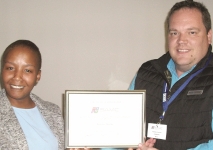
At the August Technology Evening, Busisiwe Zikalala from WIKA gave a presentation titled: Sensor protection methods.

Process sensors come in many forms. In addition to the big four: temperature, pressure, level and flow, process sensors are used in many applications and are designed to take accurate measurements of the process. Busisiwe’s presentation covered the following issues:
Selecting a protective method: The amount of harmful exposure a sensor receives from the environment and harmful constituents in the measuring process depends on what is being sensed and the environment itself. Different packaging is required to cope with and survive the specific application. Two major considerations for protection are at the sensing element/transducer level or at the sensing module level.
Limiting factors of protective methods: The characteristics of a sensor developed for a given application are strongly determined by the requirements of the application and by existing sensor science and technology.
Thermowells: These protect sensors from damaging effects of the measured substance and allow removal of the sensor without compromising the process or environment. The well dimensions should provide sufficient strength to withstand stresses imposed by vibration, pressure and flow. However, sufficient immersion length is necessary for accurate temperature measurement and a large diameter increases response time. It is thus a question of striking the best balance.
Wake frequency: The biggest cause of thermowell failure is vibration due to flow of gas or liquid perpendicular to the thermowell (‘von Karmann effect’). The natural resonant frequency of the thermowell (function of mass, diameter and length) should be kept well below the wake frequency of the fluid/gas. If the two frequencies coincide, the resultant vibration can cause mechanical failure.
ScrutonWell design: This design reduces the amplitude of oscillation by more than 90%, which allows easy and fast installation of the thermowell without expensive and time-consuming rework on site. Thus no Wake frequency calculation required.
General sensor issues: Incorrect readings due to improper mounting; sensor drift due to build up; complete sensor failure; slow response due to dead time or blockage; and mechanical damage.
| Tel: | +27 11 312 2445 |
| Email: | [email protected] |
| www: | www.saimc.co.za |
| Articles: | More information and articles about SAIMC |

© Technews Publishing (Pty) Ltd | All Rights Reserved